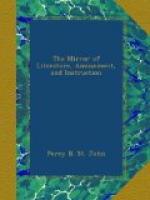The general merit of nick-nacks is unquestioned. Ornaments, I admit, are ornamental; and works of art afford intellectual amusement of the highest order. But then perfection is their only merit; and a crack or a flaw destroys all the pleasure of a sensible beholder. Yet I have not a statue that is not a torso, nor a Chelsea china shepherdess with her full complement of fingers. I have not a vase with both its handles, a snuff-box that performs its waltz correctly, nor a volume of prints that is not dogs-eared, stained, and ink-spotted. These are serious evils; but they are the least that flow from a neglect of the maxim which stands at the head of my paper. Perpend it well, reader; and bear ever in mind that, in our desires, as in our corporeal structure, it is not given to man to add a cubit to his stature. I am very tired; so “dismiss me—enough.” New Monthly Magazine.
* * * * *
NOTES OF A READER.
* * * * *
THE QUARTERLY REVIEW.
No. 81, of this truly excellent work had not reached us in time for the close reading which it demands, and our “Notes” from it at present are consequently few. The first in the number is a powerful paper on Dr. Southey’s Colloquies on the Progress and Prospects of Society—“a beautiful book,” says the reviewer, “full of wisdom and devotion—of poetry and feeling; conceived altogether in the spirit of other times, such as the wise men of our own day may scoff at, but such as Evelyn, or Isaak Walton, or Herbert would have delighted to honour.” The work is in general too polemical and political for our pages; but we may hereafter be tempted to carve out a few pastoral pictures of the delightful country round Keswick, where Dr. Southey resides. The present Review contains but few extracts to our purpose, and is rather a paper on the spirit of the Colloquies, than analytical of their merits. We take, for example, the following admirable passage on the progress of religious indifference; in which we break off somewhat hastily, premising that the reader will be induced to turn to the Review itself for the remainder of the article:—
There was a time, since the worship of images, (and happy would it have been if the religious habits of the country had thenceforth stood fixed,) when appropriate texts adorned the walls of the dwelling-rooms, and children received at night a father’s blessing;—and “let us worship God” was said with solemn air, by the head of the household; and churches were resorted to daily; and “the parson in journey” gave notice for prayers in the hall of the inn—“for prayers and provender,” quoth he, “hinder no man;” and the cheerful angler, as he sat under the willow-tree, watching his quill, trolled out a Christian catch. “Here we may sit and pray, before death stops our breath;” and the merchant (like the excellent Sutton, of the Charter House)




